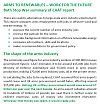New Paragraph
Resources: Publications - books and articles
If you would like to suggest any additions to this list, please send the details to us using the Contact
form
An interview with a Ukrainian pacifist
In January 2023, Marcy Winograd, Chair of the US-based Peace in Ukraine Coalition, interviewed Yurii Sheliazhenko, Executive Secretary of the Ukrainian Pacifist Movement, about the war in Ukraine and military mobilization against the Russian invasion. Yurii lives in Kyiv, where he faces routine electricity shortages and daily air raid sirens that send people running to subway stations for shelter. Inspired by pacifists Leo Tolstoy, Martin Luther
King and Mahatma Gandhi, as well as Indian and Dutch non-violent resistance, Yurii calls for an end to US and NATO weapons to Ukraine. Arming Ukraine undermined past peace agreements and discouraged negotiations to end the current crisis, he says.
Download interview (PDF)
UK Government's Security, Defence & Foreign Policy Review
We have made two submissions to the UK government's Integrated Security Review in the name of Bath's 'New Vision' group.
New Vision, convened by Bath Stop War, met face-to-face in September 2019. A sub-group then worked by email and Zoom in the first weeks of Covid-19 lockdown. We thought it right to use the New Vision name for this, thinking also that the submission might have a better chance of being read by the Defence Select Committee.
The first document, Submission to Defence Committee, is a comment on the official scope of the review. We think the scope is too narrow and takes too many things for granted, as if there were no debate on the detail of UK defence, security or foreign policy, for example the possession of nuclear weapons.
The second document, Submission to Foreign Affairs Committee, homes in on the foreign policy element of the vision for the UK, sometimes referred to as Global Britain or post-Brexit Britain. Our vision for 'the UK in the world' is set out clearly.
House of Lords Select Committee Report on "Rising Nuclear Risk, disarmament and the Nuclear Non-Proliferation Treaty Summary and Recommendations
The Select Committee prepared this report in readiness for the 2020 review of the Nuclear Non-Proliferation Treaty (NPT). Their Lordships are bothered by the stalled disarmament process, see a key role for the UK in getting things moving again, and find that government rhetoric about the UN Nuclear Ban Treaty is unhelpful. They recommend (among much else) that "the Government should adopt a less aggressive tone about this treaty and seek opportunities to work with its supporters towards the aims of Article 6 of the Nuclear Non-Proliferation Treaty, which concerns disarmament." Read the full report here or follow the link in the title to see the conclusions and recommendations.
Bath Stop War
summary of CAAT
report. There are realistic alternatives to large-scale arms industry employment. This report compares arms employment with jobs in offshore wind and marine energy.
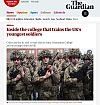
A good, short article about the UK’s child soldiers.

Article on the Saferworld
website.

Questions on what to do about terrorism are constantly put to us: here is an article from Saferworld
about the impact of most current counter-terrorism strategy and the kind of approach that is needed.
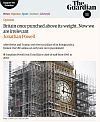
Britain once punched above its weight. Now we are irrelevant. Jonathan Powell, Nov 2017
Britain has lost its way and is having an identity crisis, says the New York Times. Just as Dean Acheson’s barb that Britain had lost an empire and not yet found a role hit home in 1962, so did an article last week by Steven Erlanger, the paper’s diplomatic editor and former London bureau chief, claiming no one knows what Britain is any more. The question is whether Britain still has real influence in the world: and the answer to that is clearly no.
Article on the Guardian
website.
Five challenges the UN’s ‘sustaining peace’ agenda needs to address: As the United Nations Secretary General Antonio Guterres releases his new Peacebuilding and sustaining peace report, Larry Attree argues
that the UN must boldly address five big challenges constraining its peace efforts.
that the UN must boldly address five big challenges constraining its peace efforts.

Challenging Militarism: a new resources pack from ForcesWatch and British Quakers (October 2017). Includes 6 case studies showing ways people are campaigning to counteract militarisation within the education system.
Resource pack
(pdf download)

Trump's Red Line
by Seymour Hersh, June 2017
Article on Welt
website by a distinguished US investigative journalist, querying the received wisdom on the supposed chemical weapons attack in Syria.
And if you're wondering why you haven't read much about this investigation in the mainstream media, this article on truthdig.com
by Jonathan Cook may be enlightening.

Two on-line articles on the Open Democracy
website:
Stop Trump – definitely! But then what?
by Celia McKeon, 20 February 2017
A nuclear world: eight-and-a half rogue states
by
Paul Rogers, 13 January 2017
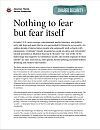
Shared Security: Nothing to fear but fear itself
- American Friends Service Committee 2016 (196kB pdf file)
The concept of shared security, based on four core principles, has been effective for generations. From the successful integration of traditional peace-making into the Navajo court system to the lasting effects of the Marshall Plan, the long-term value of pursuing shared security has been demonstrated over and over again, while militarised approaches and policies leading to increased inequality fail. The American Quaker organisation AFSC sets out the core principles.
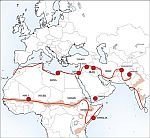
Let Them Drown - The Violence of Othering in a Warming World by Naomi Klein
London Review of Books 2 June 2016 (on-line article and podcast)
An article by Naomi Klein linking climate change, wars and migration.

Scientists for Global Responsibility: article from SGR Newsletter no.44; online publication: 5 April 2015
Dr Stuart Parkinson, SGR, examines how technological innovation contributed to one of
the most devastating wars in human history – and asks what lessons we should take from this.
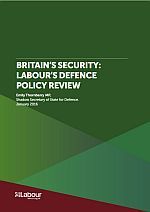
Labour Party Defence Policy Review - 2016
Shadow Defence Secretary Emily Thornberry has launched Labour’s Defence Policy Review, publishing its terms of reference and calling on Labour Party members, affiliates and the wider public to contribute to its work. Labour’s defence review will examine how the safety of the British people can best be secured in the global conditions of the 21st century, including the future of the Trident nuclear weapons programme.
Initial contributions are invited before 30 April 2016. There is no time limit on the review, but Emily is aiming to publish an interim report in June 2016. Reports will go forward to the National Policy Forum and Annual Conference for agreement. All submissions are welcome via defencereview@labour.org.uk.
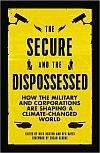
The Secure and the Disposessed: How the Military and Corporations Are Shaping a Climate-Changed World
edited by Nick Buxton & Ben Hayes, foreword by Susan George
Pluto Press 2015
Pluto Press 2015
While the world’s scientists and many of its inhabitants despair at the unfolding impacts of climate change, corporate and military leaders see nothing but challenges and opportunities. For them, melting ice caps mean newly accessible fossil fuels, borders to be secured from ‘climate refugees’, social conflicts to be managed, and more failed states in which to intervene. With one eye on the scientific evidence and the other on their global assets and supply chains, powerful elites are giving increasing thought as to how to maintain control in a world gradually reshaped by climactic extremes.
The Secure and the Dispossessed looks at these deadly approaches with a highly critical eye. It also considers the flip-side: that the legitimacy of the global elite is under unprecedented pressure – from resistance by communities to resource grabs to those creating new ecological and socially just models for managing our energy, food and water.
Adaptation and resilience to a climate-changed world is desperately needed, but the form it will take will affect all of our futures. This collection of authoritative essays by high profile journalists, academics and activists will shape this most important of debates for years to come.

Guantanamo Diary
by Mohamedou Ould Slahi
Canongate Books 2015
Since 2002, Mohamedou Slahi has been imprisoned at the detention camp at Guantánamo Bay, Cuba. In all these years, the United States has never charged him with a crime. A federal judge ordered his release in March 2010, but the U.S. government fought that decision, and there is no sign that the United States plans to let him go.
Three years into his captivity Slahi began a diary, recounting his life before he disappeared into U.S. custody, "his endless world tour" of imprisonment and interrogation, and his daily life as a Guantánamo prisoner. His diary is not merely a vivid record of a miscarriage of justice, but a deeply personal memoir—-terrifying, darkly humorous, and surprisingly gracious. GUANTÁNAMO DIARY is a document of immense historical importance and a riveting and profoundly revealing read.

The Drone Eats with Me - diaries from a city under fire by Atef Abu Saif
Foreword by Noam Chomsky, illustrations by Janice Hickman
Commapress Books 2015
‘Witnessed, lived, and recorded page by page. A searing account of living through the 2014 bombardment of Gaza. We who report it can never capture the true scale of individual and collective suffering. As a Gaza resident, Atef Abu Saif's diary provides an insight no outsider could ever have achieved.’ – Jon Snow, Channel 4 News

We Kill Because We Can
by Laurie Calhoun
Zed Books 2015
'By far the best book on drone warfare and the ethics of targeted assassinations to date. Powerful and eloquent, Laurie Calhoun elucidates a set of convincing arguments as to why drone killing is ethically indefensible and strategically counterproductive, but also why it is so seductive to our governments. It should be required reading for politicians, military planners and journalists.' Richard Jackson, author of Confessions of a Terrorist

Understanding Nonviolence by Hallward & Norman
Wiley 2014
This book offers a comprehensive introduction to non-violence in theory and practice. It explores the varied approaches, aims, and trajectories of non-violent campaigns from Gandhi to the present day. Useful reading for activists, students and teachers of contentious politics, international security, and peace and conflict studies.

Arms to Renewables - Work for the Future (downloadable pdf)
CAAT 2014
A report by CAAT on how the UK could create jobs in renewables sector and diversify skilled workers away from the destructive and expensive arms industry.

Spectacle, Reality, Resistance: Confronting a Culture of Militarism
by David Gee
ForcesWatch 2014
David Gee takes a fresh look at a culture of militarism in Britain, exploring these dynamics – distance, romance, control – in three essays, accompanied by three shorter pieces about the cultural treatment of war and resistance to the government's increasingly prodigious efforts to regain control of the story we tell ourselves about war.

Forces Watch 2013
BEFORE YOU SIGN UP
Thinking of joining the armed forces? Know the facts don't become an economic conscript. It's not all it's cracked up to be. Being in the army can seriously damage your health. How many politician's children sign up? This report shows that post-war mental health problems are most common in young soldiers from disadvantaged backgrounds and that recruitment brochures are very misleading.

Investment in Blood: The True Cost of Britain's Afghan War
by Frank Ledwidge
Yale 2013
Ledwidge argues that Britain has paid a heavy cost – both financially and in human terms – for its involvement in the Afghanistan war. He calculates the high price paid by British soldiers and their families, taxpayers in the United Kingdom, and, most importantly, Afghan citizens, highlighting the thousands of deaths and injuries, the enormous amount of money spent bolstering a corrupt Afghan government, and the long-term damage done to the British military’s international reputation. In this exposé, based on interviews, rigorous on-the-ground research, and official information obtained through the Freedom of Information Act, Ledwidge argues that the only true beneficiaries of the conflict are development consultants, international arms dealers, and Afghan drug kingpins, he provides a powerful, eye-opening, and often heartbreaking account of military adventurism gone horribly wrong.

Deception in High Places: A History of Bribery in Britain’s Arms Trade
by Nicholas Gilby
Pluto Press 2014
This book charts British government's involvement in arms trade corruption and presents the fullest history yet of bribery in Britain’s arms deals with Saudi Arabia. It includes the back-story of the controversial termination of a Serious Fraud Office corruption investigation following pressure by the Saudi Royal Family and the British establishment.

Unmanned - Drone Warfare and Global Security
by Rogers & Hill
Pluto Press 2014
Providing an unparalleled account of new forms of 21st century imperial warfare, Unmanned shows how drone systems dissolve the conventional obstacles of time and space that have traditionally shaped conflict in the international system. It considers the possibility that these weapons will become normalised in global conflict, raising the spectre of new, unpredictable and unaccountable forms of warfare.

Killer Drones
- report
War on Want 2013
Killer Drones exposes UK complicity in Israel’s crimes against theKiller Drones Palestinian people. UK and Israeli defence forces are developing a new surveillance drone – the Watchkeeper. The design of this is based closely on Elbit’s Hermes 450 model, extensively used over Gaza. The British government is, in effect, buying technology that has been ‘field tested’ on Palestinians.

Divide and Ruin: The West’s Imperial Strategy in an Age of Crisis
by Dan Glazebrook
Liberation Media 2013
Dan Glazebrook gives clear analysis of world affairs. He reports and exposes the excesses of imperialists while enlightening a growing critical mass of people concerned about what their governments do in their name. This work is an important read for anyone seeking understanding and a more equal and free world. Economic and social issues in Britain also come under scrutiny, plus the role of the media and social movements in the UK.

Mass murder in the Middle East is funded by our friends the Saudis
by Patrick Cockburn
Independent newspaper 2013
Everyone knows where al-Qa'ida gets its money, but while the violence is sectarian, the West does nothing. For all the supposed determination of the United States and the UK to fight "the war on terror", they have showed astonishing restraint when it comes to pressuring Saudi Arabia and the Gulf monarchies to turn off the financial tap that keeps the jihadists in business.

Israel and the Drone Wars
by Chris Cole & Mary Dobbing
Drone Wars 2014
Drone War's research shows about 50 of the 76 countries known to have some form of military UAV capability have received drones or drone technology from Israel. Scratch any drone you’ll likely find Israeli technology underneath.”

Pluto Press 2013
Corporate Europe goes beyond the divisions between nation-states, focusing instead on the division between the corporate elite and the peoples of Europe.
Cronin reveals how the EU’s policies on health, climate change, armaments and food safety have been tailored to please an unaccountable elite. He explores how ideologically blinkered lobbyists have seized on the financial crisis of recent years to entrench the casino capitalism that caused the crisis in the first place.
What emerges is a powerful exposé of how vested interests in the EU have manipulated opportunities to introduce ideologically-driven reforms.

Offensive Insecurity: The role of science and technology in UK security strategies
by S Parkinson, B Pace and P Webber
Scientists For Global Responsibility 2013
The report compares military R&D spending with R&D focused on understanding and tackling the roots of conflict and the longer term security threats that we face from climate change, resource scarcity and other global problems. The authors argue that security-related R&D should be based on a radical rethink of UK defence and security policy, which the current government acknowledges in theory but ignores in practice.

To End All Wars: A Story of Loyalty and Rebellion, 1914-1918
by Adam Hochschild
Cengage Learning 2012
This book focuses on the long-ignored moral drama of the war's critics, alongside its generals and heroes. Many of these dissenters were thrown in jail for their opposition to the war, from a future Nobel Prize winner to an editor behind bars who distributed a clandestine newspaper on toilet paper.
Trading Away Peace - How Europe helps sustain illegal Israeli settlements - report
International Federation of Human Rights 2012
Europe says Israeli settlements on Palestinian land are illegal under international law and yet it continues to trade with them
The European Union imports fifteen times more from Israel’s illegal settlements in the Occupied Palestinian Territory than from Palestinians themselves!

The Real History of the First World War by Neil Faulkner
No Glory 2013
A pamphlet by historian Neil Faulkner looks at the real reasons for the outbreak of the First World War. This pamphlet is part of the No Glory campaign
A pamphlet by historian Neil Faulkner looks at the real reasons for the outbreak of the First World War. This pamphlet is part of the No Glory campaign

The Democratic Republic Of Congo: Between Hope And Despair by Michael Deibert
Zed Books 2013
Over the past two decades, the Democratic Republic of Congo has been at the centre of the deadliest series of conflicts since the Second World War, and now hosts the largest United Nations peacekeeping mission in the world. Deibert writes with verve, clarity, passion, and obvious empathy for all of the peoples of the Great Lakes region, and his understanding of the regional and global contexts of the Congo wars is outstanding.

The Politics of Genocide
by Edward S. Herman and David Peterson
Foreword by Noam Chomsky
Monthly Review Press 2010
The authors expose the policy of double standards that is at the root of the ‘politics of genocide.’ The U.S.-U.K. led sanctions against Iraq after the first Gulf War is something the authors label as "perhaps the largest genocidal act in the last thirty years." These sanctions prevented Iraq from repairing its infrastructure which had been deliberately destroyed during the war's massive bombing campaign.

Guns, debt and corruption - Military spending and the EU crisis
by Frank Slijper
Transnational Institute 2013
High levels of military spending played a key role in the unfolding economic crisis in Europe and continues to undermine efforts to resolve it. At a time of austerity EU military expenditure totalled €194 billion in 2010, equivalent to the annual deficits of Greece, Italy and Spain combined but military lobbyists, warning of “disaster” if any further cuts are made to military spending.
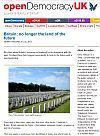
Britain: no longer the land of the future
- online article by Gerry Hassan
Open Democracy UK 2013
The UK seems now to be in permanent celebration and marking of battles and wars: whether it be the Battle of Trafalgar of 1805, the Battle of Britain of 1940, and the 2014 anniversaries: the 100th anniversary of the start of the First World War, the 75th of the beginning of the Second World War, and the 70th of the D-Day Normandy landings.
Do we really want to continue living in a culture where the loudest, most influential voices are those of past generations, who are being used to legitimise one of the most unequal places in the developed world? This is a culture which increasingly trivialises and infantilises its public life and citizens. It is as far removed as imaginable from the hopes and values of the progressive Britain which Labour, Liberals and other radical forces once stood for.

The Grey Line
by Jo Metson Scott
Dewi Lewis 2013
'The Grey Line' is a reflection on war told from the perspective of US and UK soldiers who have spoken out against the Iraq War. Photographer Jo Metson Scott began the project after meeting a young American soldier who had been denied Conscientious Objector status and had gone AWOL in order to avoid redeployment to Iraq.

Generation Palestine: Voices From The Boycott, Disinvestment And Sanctions Movement
ed. Rich Wiles
Pluto Press 2013.
This book shows how the BDS movement aims to pressure Israel until it complies with International Law, mirroring the model that was utilised against South African apartheid.
Contributors include Archbishop Desmond Tutu, Ken Loach, Iain Banks, Ronnie Kasrils, Professor Richard Falk, Ilan Pappe, Omar Barghouti, Ramzy Baroud and Archbishop Attallah Hannah, alongside other internationally acclaimed artists, writers, academics and grassroots activists.
Dirty Wars
by Jeremy Scahill
Perseus Books 2013
Jeremy Scahill documents the new paradigm of American war: fought far from any declared battlefield, by units that do not officially exist, in thousands of operations a month that are never publicly acknowledged.
"The devastating picture that emerges in Dirty Wars is of a secret U.S. killing machine that has grown more powerful than whatever president happens to reside in the White House. Scahill argues that far from keeping the United States — and the world — safe from terrorism, these covert American wars ensure that the terror will grow and spread."

Towards a World War III Scenario: The Dangers of Nuclear War
by Michel Chossudovsky
Global Research 2012
The US has embarked on a military adventure, “a long war”, which threatens the future of humanity. US-NATO weapons of mass destruction are portrayed as instruments of peace. Mini-nukes are said to be “harmless to the surrounding civilian population”. Pre-emptive nuclear war is portrayed as a “humanitarian undertaking”.

The Globalization of NATO
by Mahdi Darius Nazemroaya
Clarity Press2012
NATO’s existence was justified by Soviet threats to Western Europe. That raison d’être is long gone with the collapse of the Soviet Union and the end of the Cold War. Still NATO globalized relentlessly, moving from defensive to offensive under pretexts of humanitarianism, starting with Yugoslavia, then East Africa, Afghanistan, and most recently Libya, acting as an arm of the Pentagon. The danger to global equilibrium is a growing NATO being expanded further by American and British ambitions into a monster military force of world proportions, way beyond any Atlantic or European alliance.

The Economics of Killing - How the West Fuels War and Poverty in the Developing World
by Vijay Mehta
Pluto Press 2012
Mehta shows how attempts at peaceful national development are routinely blocked by Western powers. Economics of Killing. He locates the 2008 financial crisis in US attempts to block China's model of development; shows how Europe and the US conspire with regional dictators to prevent countries from developing advanced industries, and how this system has fed terrorism.
Mehta argues that a different world is possible, based on policies of disarmament, demilitarisation and sustainable development. This will be of great interest to anyone concerned about the consequences of endless war fuelled by the West.
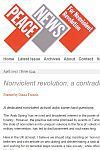
Nonviolent revolution: a contradiction in terms
article by Diana Francis
Peace News 2012
"Here in the UK at least, I believe we should stop insisting on ‘nonviolent revolution’ as the goal of true believers and concentrate on articulating and disseminating a radical agenda for change, building support for it and working for incremental steps towards a new society, while offering direct resistance as part of that whole process".

Drone Warfare - Killing by Remote Control
by Medea Benjamin
Foreword by Barbara Ehrenreich.
OR Books 2012
“In this book, Medea Benjamin makes it clear that drones are not just another high-tech military trinket. Drone Warfare sketches out the nightmare possibilities posed by this insane proliferation.”

Lifting the lid on Menwith Hill
by Stephen Schofield
Yorkshire CND 2012.
The report, funded by the Joseph Rowntree Foundation, covers:
Menwith Hill's strategic role as a regional intelligence base illegally collecting and analysing information from satellites, phone tapping and the interception of internet traffic. The interception of tenders for international contracts by European and British-based companies, the details of which are passed on to US-based corporations for commercial advantage.
The role that Menwith Hill plays in information-led warfare for US military actions such as drone attacks.
An examination of claims made by the US authorities, and repeated in Parliament, of the economic benefit of the base to the local community.
The hidden economic costs of the base and the degree to which these are subsidised by the UK taxpayer.

Dispatches from the Dark Side: On Torture and the Death of Justice
by Gareth Peirce
Verso Books 2012
Acclaimed examination of the British government’s complicity in torture. Gareth Peirce shows that the British government has colluded in a whole range of extrajudicial activities – rendition, internment without trial, torture – and has gone to extraordinary lengths to conceal its actions. Its devices for maintaining secrecy are probably more deep-rooted than those of any other comparable democracy.

Cities Under Siege: The New Military Urbanism
by Stephen Graham
Verso Books 2010
A powerful exposé of how political violence operates through the spaces of urban life.Stephen Graham shows how Western militaries and security forces now perceive all urban terrain as a conflict zone inhabited by lurking shadow enemies. Urban inhabitants have become targets that need to be continually tracked, scanned and controlled. Graham examines the transformation of Western armies into high-tech urban counter-insurgency forces. He looks at the militarization and surveillance of international borders, the use of ‘security’ concerns to suppress democratic dissent, and the enacting of legislation to suspend civilian law. In doing so, he reveals how the New Military Urbanism permeates the entire fabric of urban life. Is Gaza a test-bed for this control process?

Fuel on the Fire
by Greg Muttitt
New Press 2012
Fuel on the Fire reveals how the occupying powers have sought to return Iraq's oil industry to multinational companies - for the first time since it was nationalised in the early 1970s.But America and Britain failed to take into account the determination of the Iraqis themselves - of civil society groups as well as senior oil experts - to keep production in the public sector. The book helps us draw lessons for the future: what will be the impact of Iraq signing contracts with BP, Shell, ExxonMobil etc; and what does the Iraq war tell us about events in Libya and the broader Middle East?

The Shadow World
by Andrew Feinstein
Picador 2011
The harrowing behind-the-scenes tale of the global arms trade, revealing the deadly collusion that exists among senior politicians, weapons manufacturers, felonious arms dealers, and the military—a situation that compromises our security and undermines our democracy.
Pulling back the curtain on this secretive world, Feinstein illuminates the impact this network has not only on conflicts around the world but also on the democratic institutions of the United States and the United Kingdom.
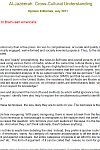
14 Propaganda Techniques Fox News TV Uses to Brainwash Americans
article by Cynthia Boaz
Al-Jazeera 2011
Dr. Cynthia Boaz of Sonoma State University is an analyst and consultant on nonviolent action and vice president of the Metta Center for Nonviolence.
Fox audiences often defend their arguments by pointing to the fact that a lot of people share the same perceptions. This is a reasonable point considering that Murdoch's News Corporation reaches a larger audience than any other single media outlet.

REEL POWER Hollywood Cinema and American Supremacy
by Mathew Alford
A very timely book. The Hollywood myth is that its films are just 'entertainment'. Far from it. The author shows that American industrial cinema propagates ideas favourable to its right wing establishment. Read this book before you see the next blockbuster. (Ken Loach)
Pluto Press 2010
A very timely book. The Hollywood myth is that its films are just 'entertainment'. Far from it. The author shows that American industrial cinema propagates ideas favourable to its right wing establishment. Read this book before you see the next blockbuster. (Ken Loach)

Convenient Killing: Armed Drones and the ‘Playstation’ Mentality
FOR 2010
The Fellowship of Reconciliation (FoR) have launched a new report on the use of armed drones. Conservative estimates suggest that US drones in Pakistan kill one civilian for every two combatants, but the Ministry of Defence has refused to release any figures about the UK’s own drones.
The UK government rents Hermes 450 drones from Israel on a ‘pay-by-the-hour’ basis. Arms companies including BAE Systems are facing sharp criticism for the growth of robotic weapons that allow operators to kill people thousands of miles away.

BRIBING FOR BRITAIN
by Tim Webb
CAAT 2007
A booklet written by the author and trade unionist Tim Webb. It pulls together the major events and players in the Serious Fraud Office-BAE-Saudi Arabia story, provides the necessary background and analysis, and presents it in one accessible, highly readable account.

Taking Aim at the Arms Trade - NGOs, Global Civil Society and the World Military Order
by Anna Stavrianakis.
Zed Books 2010
"Although this book is a study of a specific group of non-government organisations in just one country – the arms trade control movement in Britain – it is highly relevant to much wider aspects of non-government public action right across the world." Paul Rogers, Bradford University.

Secret Affairs: Britain’s Collusion with Radical Islam
by Mark Curtis
Serpent’s Tail 2010
Mark Curtis’ book recounts the history of British collusion with radical Islamic and terrorist groups. “Startling and deeply disturbing evidence about how, in an effort to preserve declining influence in the world’s oil-producing regions, the government has lent frequent and critical support to the states that have been the primary sponsors of radical Islam and the terrorism that it spawns...’ Noam Chomsky.
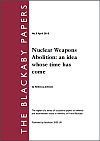
Nuclear Weapons Abolition - an idea whose time has come
by Rebecca Johnson (pdf download)
Abolition 2000 UK 2010
Rebecca Johnson (Acronym Institute for Disarmament Diplomacy and former senior advisor to the International WMD Blix Commission) argues for active engagement, and for determination and long-term commitment from civil society and governments to make progress against vested interests who shore up nuclear arsenals and drive continuing nuclear proliferation and insecurity into the 21st century.

This Time We Went Too Far - The Truth and Consequences of the Gaza Invasion
by Norman Finkelstein
OR Books 2011
The title of this book is a quote from the Israeli journalist Gideon Levy who examined his country's justifications for the invasion and found none of them held water.

The Shock Doctrine -The Rise of Disaster Capitalism
by Naomi Klein
Penguin 2008
Around the world in Britain, the United States, Asia and the Middle East, there are people with power who are cashing in on chaos; exploiting bloodshed and catastrophe to brutally remake our world in their image. They are the shock doctors.

WAR ON TERROR, Inc
by Solomon Hughes
Verso Books 2008
Who is behind companies that reap the dividend of war? How close are they to our political decision-makers? Do they actually deliver what they are contracted to deliver, and at a cost-effective price? Hughes catalogues the appalling record of private contractors doing our governments’ dirtiest work, and asks how we can possibly justify delivering into the hands of market forces an area of public life which requires the very highest standards of scrupulousness and integrity.

BLACKWATER
by Jeremy Scahill
2007, revised 2015
On September 16, 2007, machine gun fire erupted in Baghdad's Nisour Square leaving seventeen Iraqi civilians dead, among them women and children. The shooters were private forces working for the secretive mercenary company, Blackwater Worldwide. If you have the money they will supply the mercenaries. When the US and UK governments withdraw troops from Iraq these "private security personnel" step in and stay there long after the troops leave.

MAKING ARMS, WASTING SKILLS - Alternatives to militarism and arms production by Steven Schofield (pdf download)
CAAT 2008
Arms production is now an international military-industrial network, dominated by US-based corporations the essential function of which is to support the United States in maintaining its military supremacy. BAE, which already had an effective monopoly position in UK arms manufacture, is now one of the largest suppliers to the Pentagon, generating more sales in the US than the UK. Various trends are clear, including the increasing use of foreign subsidiaries and the rationalisation of the traditional, domestic arms manufacturing bases in the USA and Europe, with significant job losses. For example, since the early 1980s, UK arms-related employment declined from 740,000 to 315,00 by 2006.
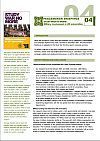
Study War No More: Military Involvement in UK Universities (pdf document)
FoR 2006?
The fourth of the Fellowship of Reconciliation’s Peacemaker Briefings, ‘Study War No More: Military Involvement in UK Universities’.
Universities are publicly funded institutions and yet information on military funding of higher education is often not available within the public domain.
This also compliments the CAAT campaign to expose investment by British Universities in arms companies.

THE FAÇADE OF ARMS CONTROL
by Anna Stavrianakis (pdf document)
CAAT 2008
How the UK's export licensing system facilitates the arms trade This 2008 publication, written by an academic at the University of Sussex, is the ideal publication for anyone who has struggled to reconcile the wide variety of government, campaign organisation and media pronouncements on the issue of arms control.

Unpeople: Britain’s Secret Human Rights Abuses
by Mark Curtis
Vintage 2004
Mark Curtis’ book shows that Britain is complicit in the deaths of ten million people since 1945. These are Unpeople – those whose lives are seen as expendable in the pursuit of Britain’s economic and political goals. The book pieces together the Blair government’s “public deception campaign” on Iraq and reveals government plans to increase “information operations” directed towards the public and to embark on a new phase of global military intervention.

The New Rulers of the World
by John Pilger
Verso 2002
The award-winning journalist selects from his "Guardian" and "New Statesman" essays on power, its secrets and illusions. The title is from his television film about the mythology of globalization; in which he revealed how General Suharto's bloody seizure of power in Indonesia in the 1960s was part of a Western design that was the beginning of globalization in Asia. In this book, John Pilger discloses more of Indonesia's secret history, as well as describing the price paid by the people of Iraq for the West's decade-long embargo. The author also contemplates the September 11th terrorist attacks on America and the causes.

Rethinking War And Peace
by Diana Francis
Pluto Press 2004
Is war ever a just way to resolve conflict? Diana Francis argues that it is not. With passion and eloquence, she mounts a head-on challenge to the belief that war as an institution is either necessary or effective for good.
About the Author
Diana Francis is one of the world's most experienced practitioners of conflict resolution and has worked with local activists in Europe, Asia, Africa and the Middle East. She is a former President of the International Fellowship of Reconciliation and an active member of the Bath Stop the War Coalition.

People, Peace and Power: Conflict Transformation in Action
by Diana Francis
Pluto Press 2002
'Millions of people around the world live in countries torn apart by war, where violence and suffering are part of everyday life. Yet in all those countries there are groups of people working for peace in the midst of war, standing up for human rights and decency. What difference can they make? What can be done to support them, and to help dialogue to happen in the midst of hostility and violence? This book examines these questions, focussing on the roles that ordinary people can play as peace builders in societies where violence and antagonism have become the norm, where inter-communal relationships are fractured or where institutions and the rule of law have collapsed. It examines the theory and practice of conflict transformation and its relevance for different cultures and contexts.



